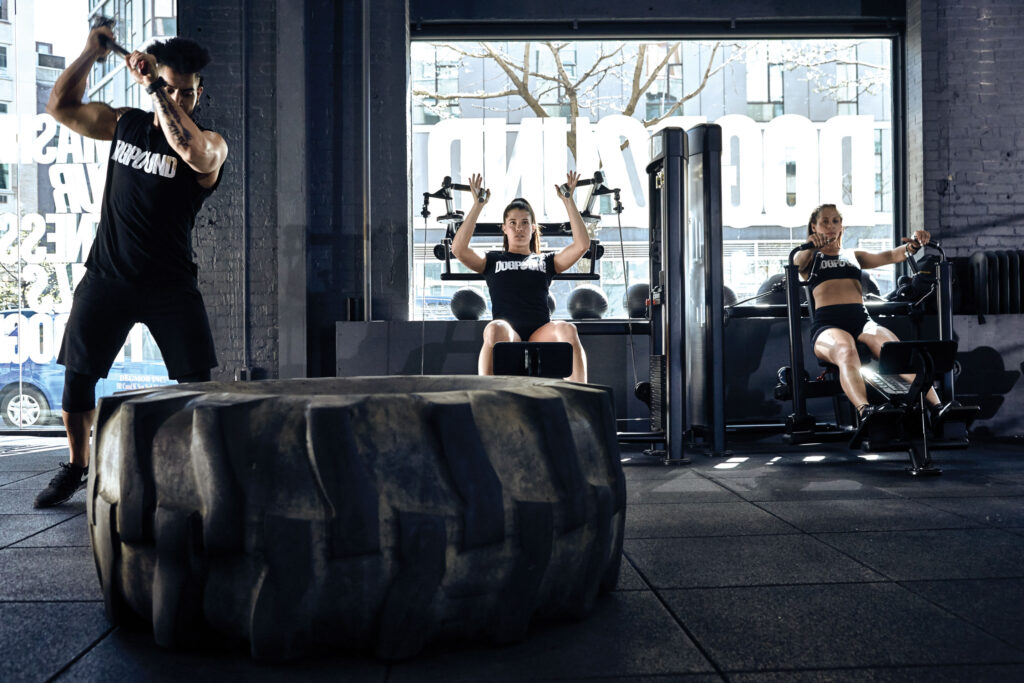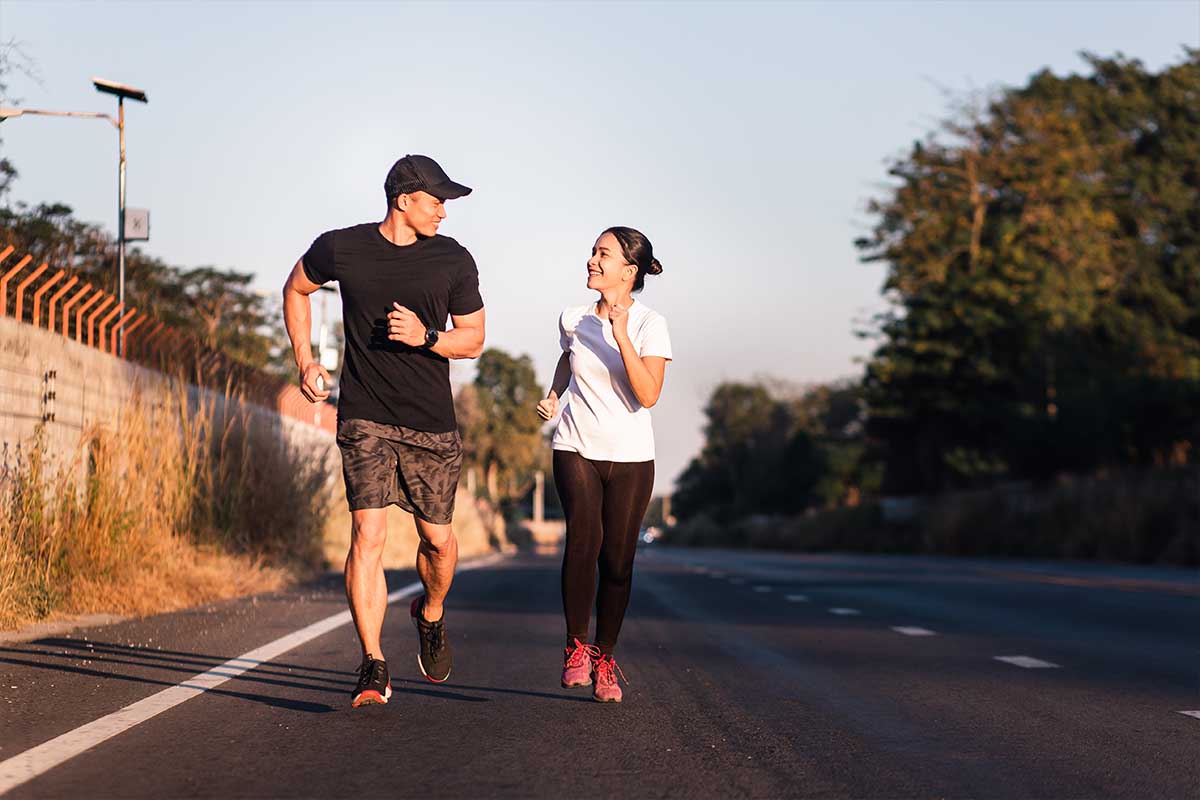Advertisement
Off-the-Chain Fitness
Meet The Dogpound: New York’s ruffest fitness destination

The Dogpound’s open floor-plan gym is dim, the walls are lined in sleek mirrors and upbeat, rhythmic music pulses so loudly you don’t hear the weights drop. Packed with top-of-the-line weight-lifting equipment, a huge boxing ring and tons of floor space, it’s easy to see why the gym draws an exclusive clientele: everyone from Victoria’s Secret models to Hollywood actors to famous musicians.
The vibe may be that of a trendy night out in Lower Manhattan—the gym is nestled into a quiet corner of Canal Street—but the energy is exactly what you’d expect from a room full of trainers pushing their clients’ workouts hard. They sport matching black shirts, with “DOGPOUND” stamped in block letters across the front. One trainer stretches a client; another is coaching his through a core workout, wearing the customary t-shirt with black skinny jeans and a fashionable scarf. They laugh and chat between sets, with their clients and each other.
The man responsible for the sleek vibe and welcoming atmosphere is Kirk Myers, a Kansas City native, who strolls over as he hangs up his cellphone. His Dogpound shirt reads “Captain Kirk” on the back, and he proves to be just as friendly as his staff. Myers is exceptionally warm and confident, but lacking the arrogance of many successful businessmen. He describes his look as a bit rough, gesturing to his full sleeves of tattoos, but as he does so, his sparkly blue-painted fingernails (an ode to his days of teaching step aerobics) glint in the light.
“I used to be super fat growing up,” Myers explains, gesturing down to his now muscular frame. “I weighed 300-plus pounds in high school, and I got diagnosed with heart disease at 21, which ended up being the best thing that could possibly happen because I started studying nutrition and working out.”
Like his personal journey to fitness, Myers’s path to becoming a player in Manhattan’s bustling fitness scene was a winding one. He started out training in Kansas City, and then moved to New York to be close to his brother. There, he built up a client base through his pre-Dogpound business, Kirk Fitness. Although Myers’s business started out small, it quickly grew, and he joined forces with his friend and fellow trainer Brey Peña, followed by Peña’s brothers Dawin and Dennis.
About five years after landing in NYC and starting fresh as a trainer, he now has his own space in Tribeca, a staff of 11 trainers and a continually growing client base. As for the name, “The Dogpound” started as a joke by a client who brought his dog with him to workouts, and it stuck. When asked if the gym is expensive to rent, Myers just laughs.
“My passion is training,” he explains of his success. “I like to work out myself, but I love helping other people reach their goals. Training is one of the few fields that you could be in that’s really rewarding.”
Training is a huge part of Myers’s life and business, so unsurprisingly his workouts are not easy. The Dogpound trainers come from a variety of backgrounds—yoga instructors to dancers to weight lifters—and the diversity in the workouts they offer is a big part of the appeal.
“It’s basically a fusion of a little bit of yoga (I’m obsessed with yoga), strength training, core and cardio, and then I even fused some barre moves and step aerobics in there,” says Myers. “Based on that, I see what a client’s goals are and we take it from there, but what we do here is focused on being a fullbody workout.”

All bark and no bite? Dogpound trainers might be friendly, but don’t let the smiles fool you: their workouts are tough.
His clients, evidently, are seeing results. People who work out at The Dogpound range from models and actors, who are dedicated to their levels of fitness, to some clients who really don’t know a thing about working out. Myers likes training the latter best, he says, because he’s actually able to teach them things they don’t know and impact their lives.
While it’s easy to think a successful gym is made by fancy equipment and super-effective workouts, Myers has another explanation for The Dogpound’s success: the people.
“There are two things that make this gym special,” Myers explains. “One is that we work as a team, which is kind of rare. The other is that we’re based off of having positive energy. We’re a gym that welcomes you and makes fitness a lifestyle, not just a place you drop in for a quick sweat.”
If lifestyle fitness is Myers’s goal, he’s certainly doing it well. His trainers, and the owner himself, are all smiles. The Dogpound is Manhattan’s hottest fitness destination, and it’s only been open since April 2016. For celebs and casual gym-goers alike, The Dogpound is definitely worth a visit (dogs welcome).
5 essential fitness supplements
If you’re smashing it in the gym in hopes of getting fitter, you need to maximize your nutrition too. Use these supplement guidelines to make the most of your workout.
1. Caffeine for energy
When to take it? Pre-workout
How much? No more than 400 mg per day
Studies show caffeine may improve speed and endurance, especially if you’re doing a cardio activity like running or cycling. Look for an energizing pre-workout supplement (such as a powder you can mix with water) that contains caffeine sourced from green tea or yerba maté.
2. Protein powder for recovery
When to take it? Post-workout
How much? 10 to 20 g per serving
Protein powder blended up in a smoothie conveniently rehydrates and delivers a dose of recovery-boosting nutrients. Ideally, drink a protein-packed smoothie about 30 minutes after exercising to promote lean muscle growth. Use a plant-based protein powder made from hemp, soy or pea protein.
3. Multivitamin for maintenance
When to take it? Within 30 minutes of a meal
How much? Look for a multi that provides close to 100 percent of the daily value for most vitamins and minerals.
If you work out often, you may need extra vitamins and minerals to replenish what’s lost during exercise. Although most athletes can meet these increased needs by eating a balanced diet, a daily multi can be your nutritional insurance policy.
4. Creatine for power
When to take it? Post-workout
How much? Up to 5 g per day
Love lifting weights? Creatine supplements might help you power through more reps. Your body naturally produces creatine, but your muscles use it up during intense exercise—that’s one reason why the tenth bicep curl feels so much harder than the first. Dietary creatine is found only in animal products, so creatine supplements are particularly beneficial for plant-powered athletes.
5. BCAAs for bulk
When to take it? About 30 minutes before and after a workout
How much? 3 to 5 g per serving
Branched chain amino acids (BCAAs) are made up of three essential amino acids, which your muscles use for energy. Available as tablets or drink powders, BCAA supplements may spur muscle growth by reducing the breakdown of muscle tissue during a tough workout. BCAA supplements might also reduce post-workout soreness.
PHOTOS BY Nigel Barker





